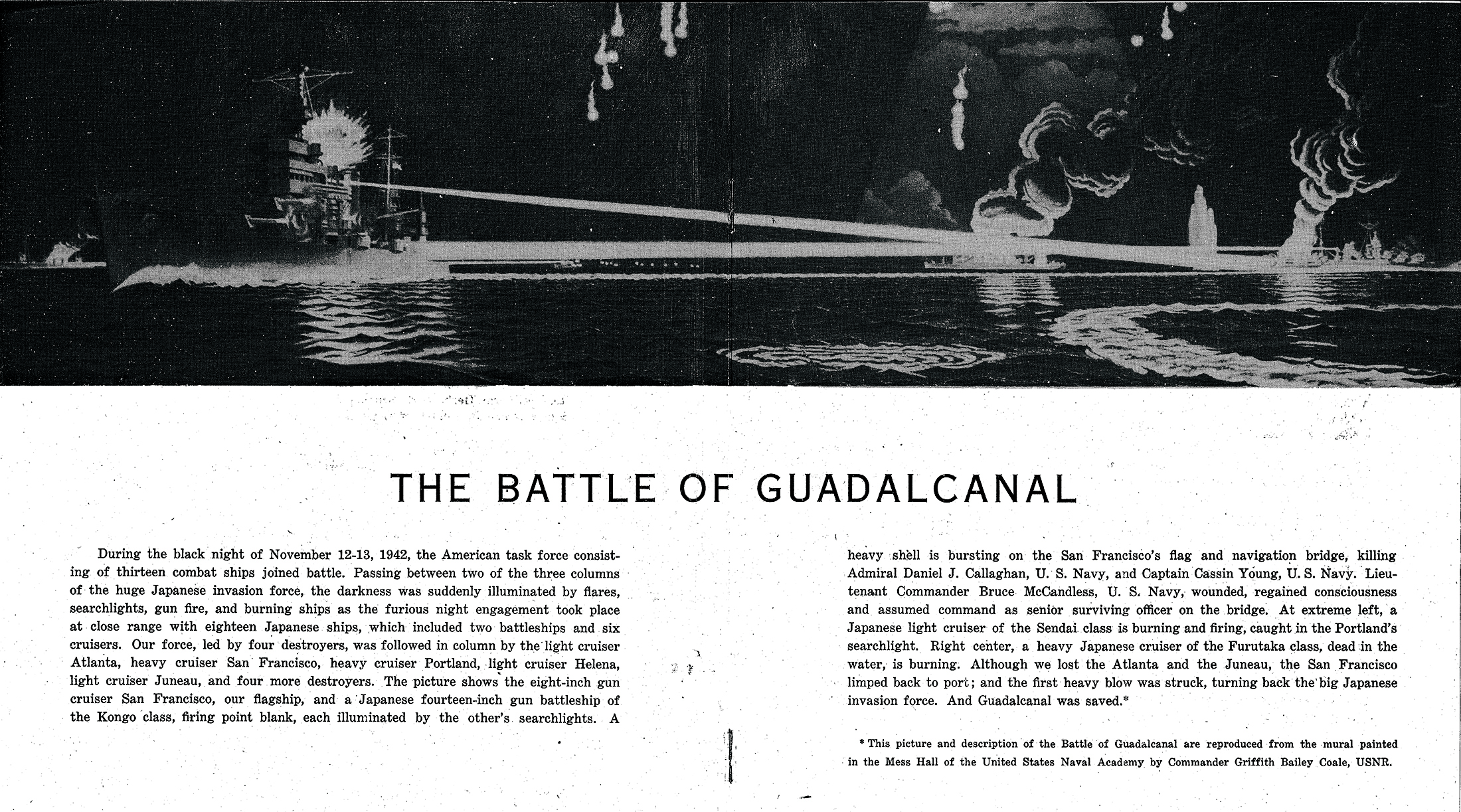Hero — Edwin Henry Japp’s grand-niece reflects on how the family, community honored him

Submitted images The above image shows the eight-inch gun cruiser San Francisco and a Japanese 14-inch gun battleship, firing point blank, illuminated by their searchlights. The photo was included in the “Program of Dedicatory Ceremonies, San Francisco, Nov. 12, 1950,” as a memorial to the officers and men who gave their lives for their country in the Battle of Guadalcanal.
Editor's note: This story has been modified to correct a name.
Many veterans decline to talk about their time in the military, and some military members never even have the chance.
Edwin Henry Japp, who grew up in Osage and Upton, left Upton High School at age 17 to enlist on Feb. 24, 1942, in the United States Navy. He was killed in action on Nov. 13, 1942, at the Battle of Guadalcanal of World War II, at the tender age of 20. His parents, George and Anna (Christensen) Japp, were notified of his death in a telegram dated Dec. 3.
Second Class Seaman Japp was aboard the USS San Francisco, and his name is listed at the USS San Francisco WWII memorial at Land’s End in San Francisco and on the Tablets of the Missing at Manila American Cemetery in the Philippines, according to a website about the heavy cruiser.
Japp was one of 11 children — the second-youngest of seven boys — who were born in Kennard, Nebraska, according to his great-niece Dottie Wood, who was born in Newcastle and lived there until she was 3. Five of the boys —Earl, Russell, Leroy, James and Edwin — served in the military, which was the maximum the military would allow into the service from one family, in an attempt to avoid a family suffering the loss of more than one son, Wood told the News Letter Journal.
“They dropped everything and enlisted to go fight for our country, and I wish that they taught that more in school,” she said. “It’s like they just keep drifting away from American history and everything that was done for our freedom.”
Every man on both her dad’s side and her mom’s side enlisted in the military, Wood said. She too was going to enter the U.S. Air Force, but her grandfather talked her out of it. She was a model as a teenager, and, according to her grandfather, she “was too pretty to go into the service,” Wood said.
Edwin’s sister-in-law, Wilma Japp, who was just a year younger than him, and her daughter, Georgia Japp, a 1960 alumnus of Newcastle High School who was born four months before Edwin was killed, noted how proud they were of him and wished that he had been able to be present for the years that followed, according to Wood.
“He was just very, very sweet and kind and just a good, good man,” Wood said.
According to Wood, Edwin, whose nickname was “Manny,” and all of his brothers had “crystal blue” eyes, were tall and had very square chins. Their grandfather had emigrated from Germany via Ellis Island, and the youngest of Edwin’s sisters worked at Mare Island, making ships during World War II.
Wood said that her family also shares the story of her husband’s grandfather, who drove U-boats on the beaches of Normandy three times, dropping off orders, and came home alive. Wood said that she believes that in tiny towns — ones smaller than Newcastle — people who died in the war were either “made heroes” or never spoken about again, especially if they were unmarried and didn’t have children.
Edwin didn’t get married or have children before he was killed, but the Japp family — even with 11 siblings — was tight-knit and closely connected to the community, Wood said. Every summer, family members who had spread out around the West Coast returned to Upton with their children for a reunion, and Wood is related to several of the families with big ranches around Weston County, such as the Darlingtons and the Christensens.
Her great-aunt Hazel and her husband, Walt Wagstaff, cared for
the Upton cemetery. Both of her sets of grandparents were good friends too. George and Anna are now buried on the hill in Newcastle, according to Wood.
She said that the devotion Edwin’s whole family showed to the Weston County community was what kept Edwin’s memory alive — from her great-grandma and great-grandpa to their children, who included 1960s-era Weston County sheriff Clarence “Smokey” Japp.
“They all kept him alive because everybody knew him and those that had grown up with him and everything, they talked about him all
the time and all through the years,” she said.






